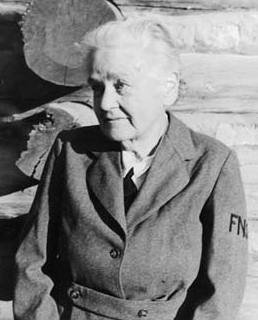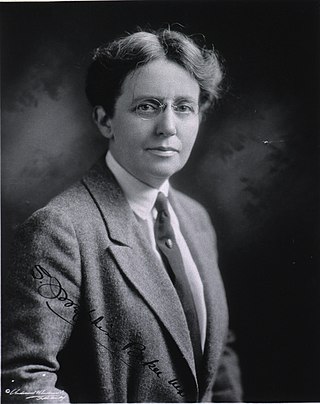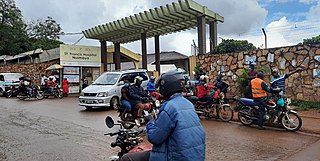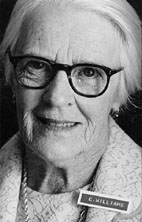
Rebecca Lee Crumpler, born Rebecca Davis,, was an American physician, nurse and author. After studying at the New England Female Medical College, in 1864 she became the first African American woman to become a doctor of medicine in the United States. Crumpler was also one of the first female physician authors in the nineteenth century. In 1883, she published A Book of Medical Discourses. The book has two parts that cover the prevention and cure of infantile bowel complaints, and the life and growth of human beings. Dedicated to nurses and mothers, it focuses on maternal and pediatric medical care and was among the first publications written by an African American on the subject of medicine.

Unassisted childbirth (UC) refers to the process of intentionally giving birth without the assistance of a medical birth attendant. It may also be known as freebirth, DIY (do-it-yourself) birth, unhindered birth, and unassisted home birth. Unassisted childbirth is by definition a planned process, and is thus distinct from unassisted birth due to reasons of emergency, lack of access to a skilled birth attendant, or other. It is also different from homebirth, although most UCs also happen within the home.

Lucille Teasdale-Corti was a Canadian physician and pediatric surgeon, who worked in Uganda from 1961 until her death in 1996. Despite considerable hardship, including civil war and the AIDS epidemic, she cofounded with her husband a university hospital in the north of Uganda.

Mary Carson Breckinridge was an American nurse midwife and the founder of the Frontier Nursing Service (FNS), which provided comprehensive family medical care to the mountain people of rural Kentucky. FNS served remote and impoverished areas off the road and rail system but accessible by horseback. She modeled her services on European practices and sought to professionalize American nurse-midwives to practice autonomously in homes and decentralized clinics. Although Breckinridge's work demonstrated efficacy by dramatically reducing infant and maternal mortality in Appalachia, at a comparatively low cost, her model of nurse-midwifery never took root in the United States.

Sara Josephine Baker was an American physician notable for making contributions to public health, especially in the immigrant communities of New York City. Her fight against the damage that widespread urban poverty and ignorance caused to children, especially newborns, is perhaps her most lasting legacy. In 1917, she noted that babies born in the United States faced a higher mortality rate than soldiers fighting in World War I, drawing a great deal of attention to her cause. She also is known for (twice) tracking down Mary Mallon, better known as Typhoid Mary.

St. Francis Hospital Nsambya, commonly known as Nsambya Hospital, is a hospital in Kampala, the capital of Uganda and the largest city in that country.

Conrad Robert Murray is a Grenadian-American former cardiologist who was the personal physician of Michael Jackson, providing medical treatment to help him sleep on the day Jackson died in 2009. In 2011, Murray was convicted of involuntary manslaughter in Jackson's death for having inadvertently overdosed him with a powerful surgical anesthetic, propofol, which was being improperly used as a bedtime sleep agent. Murray served a little less than two years out of his original four-year prison sentence.

Cicely Delphine Williams, OM, CMG, FRCP was a Jamaican physician, most notable for her discovery and research into kwashiorkor, a condition of advanced malnutrition, and her campaign against the use of sweetened condensed milk and other artificial baby milks as substitutes for human breast milk.
Irene Gleeson was a Christian missionary to the children of Kitgum District, northern Uganda, whose lives were disrupted first by war then by HIV/AIDS. She was awarded an Officer of the Order of Australia in 2009 for "service to international relations, particularly through sustained aid for children affected by war and HIV-AIDS in Northern Uganda"
Anne Merriman, MBE, MCommH, FRCPI, FRCP is a British doctor, known for her pioneering work and influential research into palliative care in developing countries in Africa. She has campaigned to make affordable oral morphine widely available.
Sarah Rebecca Parrish known as Dr. Rebecca Parish, was an American medical missionary and physician in the Philippines.
Katie Davis Majors is an American missionary and author who established a mission in Jinja, Uganda in 2007. Her work led to the founding of a school and provision of other services in Jinja, which now operate under the auspices of the Tennessee-based not-for-profit, Amazima Ministries International (AMI).
Anne Deborah Atai Omoruto was a Ugandan family physician, public health specialist, and academic. In 2014, she led a team of 12 Ugandan physicians as part of the World Health Organization's response to the Ebola outbreak in Liberia.

Jane Ruth Aceng is a Ugandan pediatrician and politician. She is the Minister of Health in the Cabinet of Uganda. She was appointed to that position on 6 June 2016. Before that, from June 2011 until June 2016, she served as the Director General of Medical Services in the Ugandan Ministry of Health.

Salomé Karwah was a Liberian nurse who was named co-Person of the Year by Time magazine in 2014 for her efforts to combat the West African Ebola virus epidemic. She appeared on the cover of Time in December 2014 with other health care workers and colleagues working to end the epidemic. Karwah survived ebola herself, before returning to work with Médecins Sans Frontières to help other patients afflicted with the disease. The actions of Karwah and other health care professionals are believed to have saved lives of thousands. However, two years later, Karwah died from complications of childbirth; her widower suggested that this might have been due to the widespread, mistaken belief that ebola survivors can still transmit the virus. Even before the ebola outbreak, Liberia had one of the highest rates of maternal mortality in the world.

Sr. Dr. Maura Lynch was an Irish doctor, a nun, and proponent of women's health.
Ruth Robertson Berrey was an American pediatrician, educator, and a medical missionary to Nigeria. Berrey was active within the Alabama Pediatric Society and became a fellow in the American Academy of Pediatrics. As a medical missionary, she helped children in Nigeria and helped reduce leprosy in the population. As a public health officer in four Alabama counties, she conducted clinics for the detection of tuberculosis, cancer, diabetes, sickle cell anemia, and other diseases.

Primah Kwagala is a Ugandan civil and human rights lawyer and CEO of the Women’s Probono Initiative (WPI) in Uganda. She has handled cases involving illegal detentions in health facilities, access to emergency obstetric care and to free vital medicines, and more. She is the Chairperson of Female Lawyers in the Uganda Law Society. Kwagala was awarded the 2020 Peace and Reconciliation Prize that was awarded by H.E Albrecht Conze, the German Ambassador in Uganda, H.E Jules-Armand ANIAMBOSSOU who is the Ambassador of France to Uganda and Henry Oryem Okello the State Minister for Foreign Affairs at the 57th Anniversary celebrations of Elysee Treaty. On Women's Day in the year, 2022, she was named by the U. S Embassy in Uganda as one of Uganda's Outstanding women of Courage and she was awarded with EU Human Right Defenders Award 2022.
No White Saviors is an anti-white saviorism social media campaign, predominately present on Instagram. It was launched by two social workers in 2018.
Savior Complex is an American true crime documentary series directed and produced by Jackie Jesko. It explores the case of Serving His Children, a nonprofit organization founded by Renee Bach. Allegations arise when Bach treated sick children without medical qualifications, resulting in the deaths of children on the charity’s watch.











